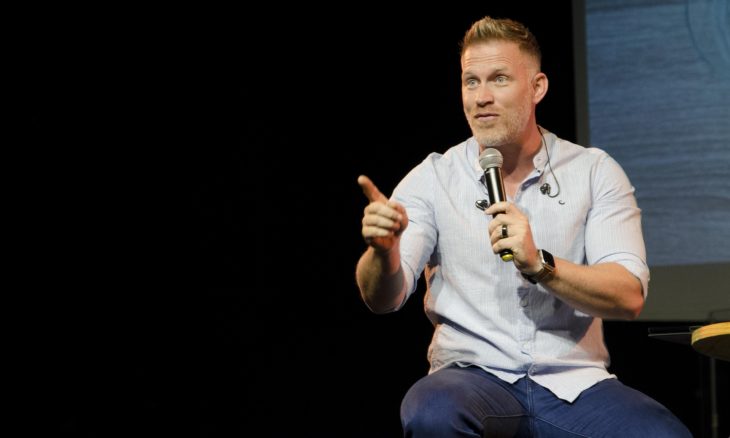
Last Updated on September 6, 2024 by Surender Kumar
Anyone can speak, but not everyone can do it well on stage, in front of an audience. This is what makes professional presenters worth paying for. They have not only confidence but also the skills to drive an event towards achieving its goals.
In organizing an event, a large part of the success depends on how well the audience is engaged. This is where a professional master of ceremonies can make a difference. An effective MC captures the audience’s attention and engages them, all while keeping the flow of the program running smoothly.
Whether you’re an organizer planning an event for a brand or an aspiring host who wants to succeed in the trade, you must understand what it takes to become a great MC. This can help you determine exactly who is perfect for the job for event organizers and how to become that very same person for MC hopefuls.
So, without further ado, here are the skills and traits a great Master of Ceremonies must possess:
Table of Contents
1. Prepared for the Expected and Unexpected
One of the most important traits of a good Master of Ceremonies is being prepared. He should do some groundwork before the event.
This is why it is normal – ideal, even – for MC presenters to ask a lot of questions about the program, the people hosting it, the guests, the content, and the goals for the gathering. Doing so helps the MC keep the program in check.
Aside from maintaining an organized flow and keeping the audience engaged, research and preparation also give an MC enough information to use in case of unexpected scenarios. Stories are kept on standby to be used when needed, and a deep understanding of the company’s culture helps address situations accordingly.
A professional MC presenter can anticipate problems and be ready for any unforeseen events. He should always have a contingency plan in case the initial plan fails.
Remember that beyond being unfazed, a good MC can deal with emergencies that could eat up time or change the course of the program. He should be able to prevent long gaps and expertly manage a session impromptu while still keeping the communication with the audience lively.
2. Articulate and Has Good Command of the Language
Being articulate and having a good command of the language is also crucial to succeed as a Master of Ceremonies. Aside from knowing how to express his thoughts clearly, this will allow an MC presenter to connect with the audience, keep them engaged, and ensure that the goal of the event is achieved.
Remember that being good in English is not just about being able to use big words with more than three syllables or weaving long sentences – it is about delivering the message unambiguously. It’s not about impressing with the statement, “It would appear to be an accurate representation of veracity,” but sending a clear and concise message with “That’s true.”
Similarly, knowing the language that the audience speaks is imperative for local speakers who wish to influence people using their voice. The same goes for slangs and jargons used within a specific demographic or industry.
3. Quick on the Uptake
Every great MC has a knack for investigative and analytical thinking. He should also be able to think on his feet and is quick on the uptake.
You see, some hosting gigs don’t give MCs the luxury of extended preparation time. In fact, some MCs are given a very short time to plan for more than one activity. An MC may be called to coordinate a brand or product launch, mediate a debate at an environmental summit, and host an entertainment awards night all in just a week’s time.
Related post: Give Your Brand Innovative Growth Using These Clever Technological Tricks
To succeed in all these endeavors, he should be able to familiarize himself with industry terminologies and communicate with different audiences at the same time. This is why presenters need the ability to think fast.
Being quick in processing information is also quite useful during the unpredicted turn of events. Remember that communication is a two-way process, which means it involves a lot of listening, too. The ability to listen and take in information beyond what’s being said through reading body language and gestures can help an MC regulate the mood, tempo, and overall direction of the program.
4. Work Well Under Pressure
Speaking on a stage in front of an enormous crowd is a fear many people don’t admit that they have. In fact, even the best MC presenters feel a bit nervous before and during their time on stage. The difference lies in how they manage it.
Working well under pressure means you admit that the stress is there, but you are prepared for it. Great MCs use certain techniques on how to handle stage fright, including shifting the focus on the objective of the task, visualizing a calming scenario, and practicing in front of a mirror.
Expert hosts also overcome the pressure of being on stage by accepting that not everything can be perfect and that even the audience understands that mistakes can happen. It’s all about getting into the right state of mind.
5. Proficient Storytelling
Storytelling is a task that not everyone can do, yet professional MC presenters must be proficient in it. From true-to-life stories to anecdotes, a great MC must be able to use the art of storytelling to engage an audience. When combined with cleverness and creativity, proficiency in storytelling can also be useful in rekindling interest when the crowd’s attention starts to waver.
6. Ability to Take Charge of the Stage
Taking charge of the stage doesn’t only entail talking on stage and conducting the flow of the program. It also means ensuring that all other aspects, particularly the lights and sounds, are working well to give the audience the optimum experience during the event.
While this might seem obvious, it isn’t always at the forefront of aspiring MCs’ minds. All speakers perform sound checks before the audience arrives, but knowing the difference between how sound travels across an empty room and one full of chattering people can help you improve the presentation.
The audience’s proximity to the sound system speakers can yield different experiences as well. If they’re too close, their ears might suffer. If they’re too far, then they might not hear what you’re saying.
The key is to work closely with those in charge of the audio to ensure that the audience has the best event experience.
So, Who Can Become an MC?
After all that, the question remains: Who can become an MC?
The answer is anyone who has the skills and traits listed in this article has a chance to become a Master of Ceremonies. However, only those who are passionate and are willing to step up can succeed.

Hisham Wyne is an internationally recognised MC, broadcaster, presenter and moderator who helps the world’s best-known brands create memorable occasions. He regularly hosts conferences, panel sessions, gala dinners and award ceremonies for some of the world’s best brands. With 150+ events under his belt, Hisham is the professional speaker that brands and agencies turn to when wanting to interview, engage and entertain government VVIPs and Hollywood celebrities.
